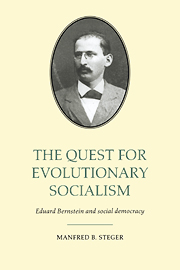Book contents
- Frontmatter
- Contents
- Acknowledgments
- List of abbreviations
- Introduction: the nature of Bernstein's quest
- Part 1 Preparation
- 1 The making of a social democrat
- 2 Persecution and exile
- 3 The “Revisionist Controversy”
- Part 2 Vision
- Part 3 Disappointment
- Epilogue: evolutionary socialism at the “end of socialism”
- Select bibliography
- Index
3 - The “Revisionist Controversy”
Published online by Cambridge University Press: 06 October 2009
- Frontmatter
- Contents
- Acknowledgments
- List of abbreviations
- Introduction: the nature of Bernstein's quest
- Part 1 Preparation
- 1 The making of a social democrat
- 2 Persecution and exile
- 3 The “Revisionist Controversy”
- Part 2 Vision
- Part 3 Disappointment
- Epilogue: evolutionary socialism at the “end of socialism”
- Select bibliography
- Index
Summary
Catching the “British disease”
Bernstein spent the exciting months leading from the lapse of the anti-socialist laws to the drafting of the Erfurt Party Program at Engels' side in London. In retrospect, it is impossible to say whether Bernstein unconsciously translated his mentor's purely tactical support of parliamentary elections and the “peaceful” transformation of capitalist society into an endorsement of “evolutionism” in principle. A series of articles in Der Sozialdemokrat, entitled “Klippen” (“cliffs”), written under his pseudonym “Leo” in the spring of 1890, illustrates Bernstein's ambiguity on this point. On one hand, he emphasized the heightened parliamentary responsibility of the SPD as a result of the elections, while on the other, he explicitly reaffirmed the party's commitment to revolution, warning against the possible degeneration of reformism into “parliamentary cretinism.”
Throughout this hectic period, however, Bernstein never neglected his burgeoning contacts in various branches of the British labor movement. Moreover, as his scholarship on seventeenth-century British radicalism grew in stature, so did his emotional connection to his adopted country. Overcoming initial cultural and linguistic barriers, his political outlook became increasingly “British” in its admiration for England's basic liberties, its parliamentarianism, and its inclination toward piecemeal social reformism. Bernstein's growing “anglophilia” raises a question frequently asked by historians of socialist thought: what is the extent of British political influence on the genesis of his revisionism? A number of Bernstein scholars have argued that it was the impact of the Fabian socialists that ultimately opened the way to his revisionist Wende (“turn”).
- Type
- Chapter
- Information
- The Quest for Evolutionary SocialismEduard Bernstein and Social Democracy, pp. 66 - 86Publisher: Cambridge University PressPrint publication year: 1997



